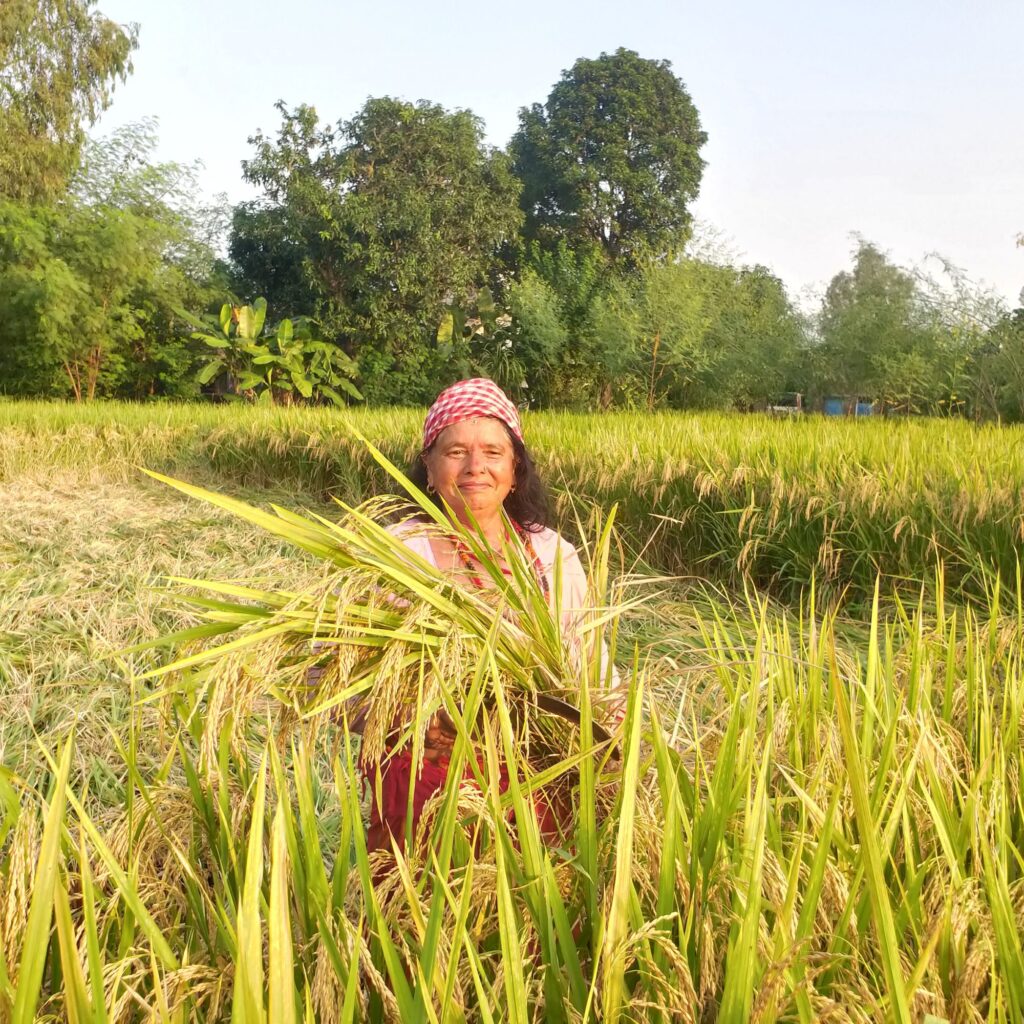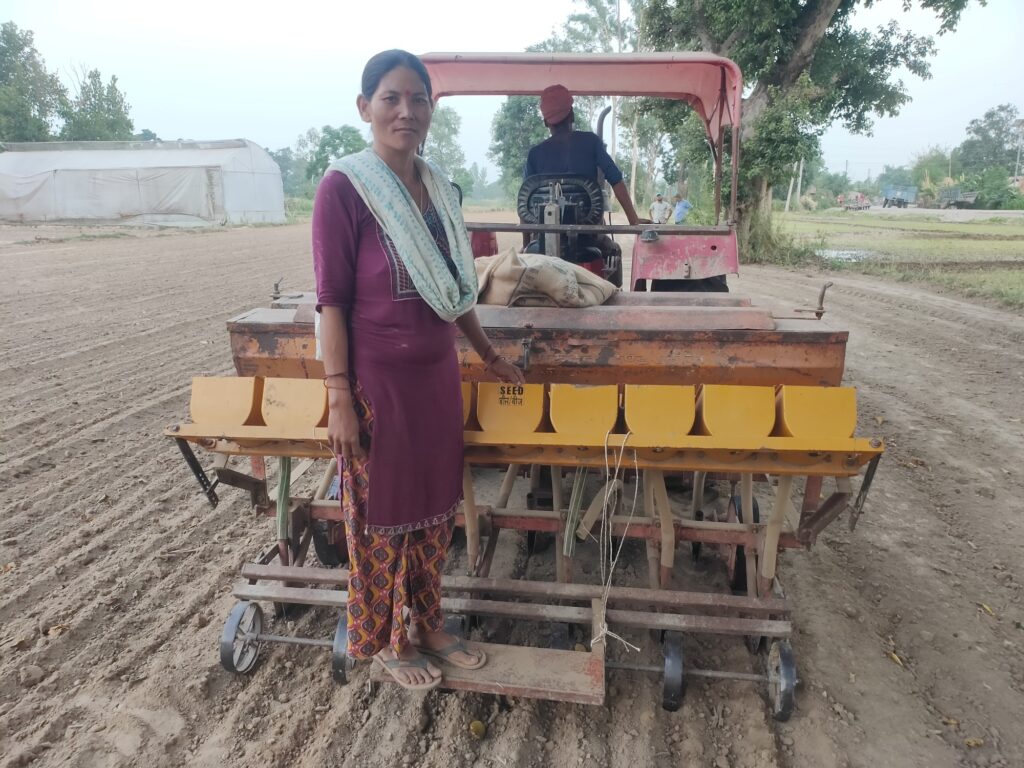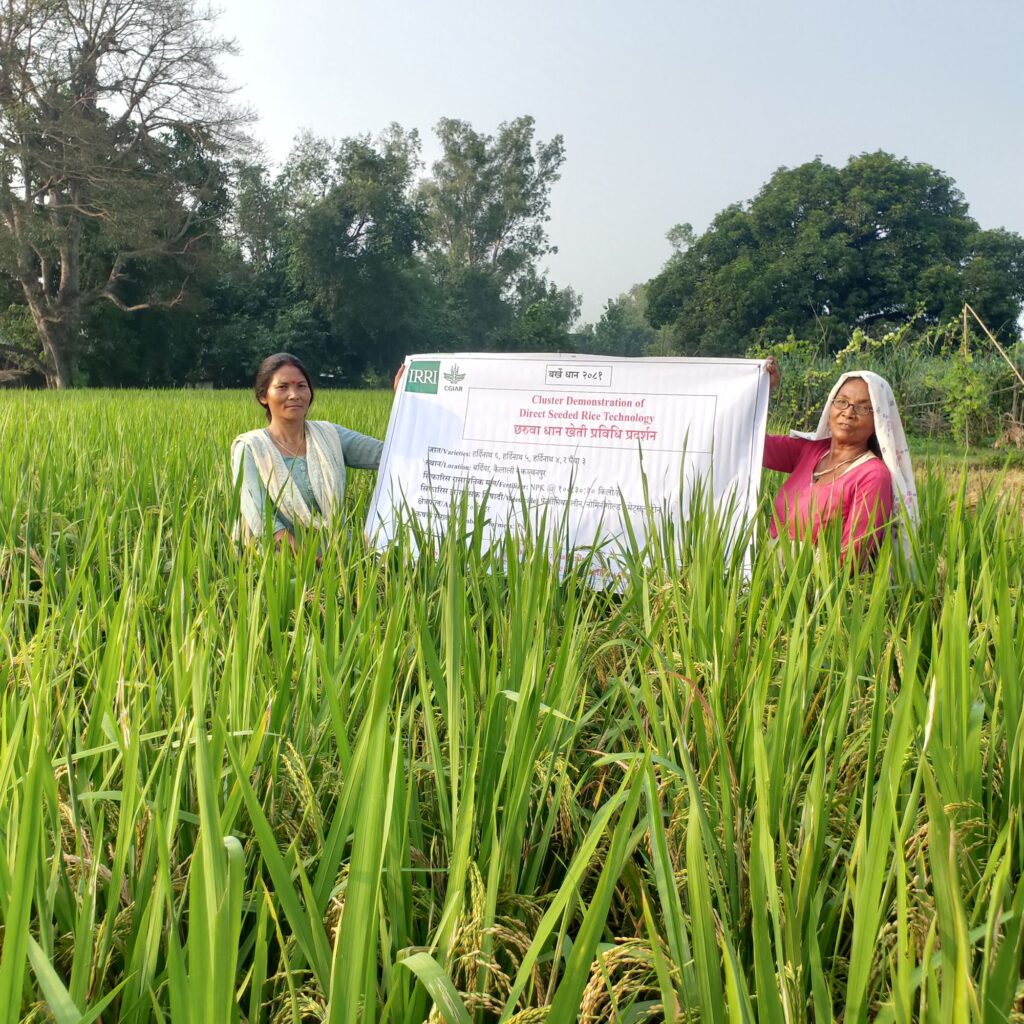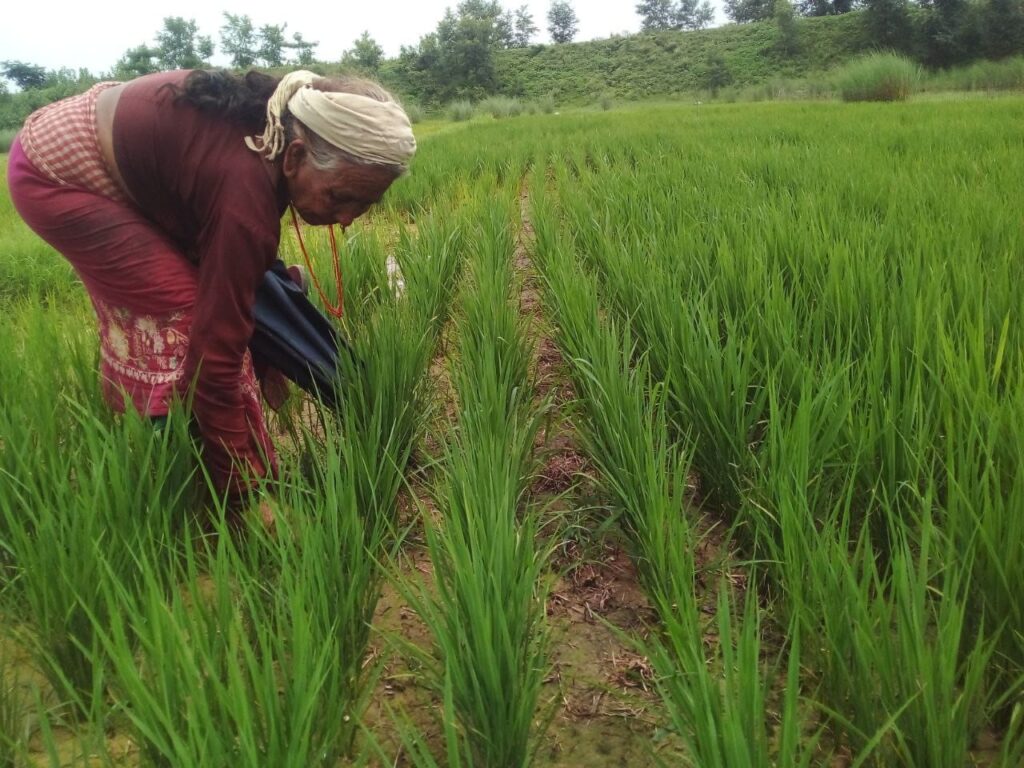In Nepal, DSR Brings Inclusive Gains for Profitable and Sustainable Rice Farming
By Prem Raj Bhatt, Rabin Kushma Tharu, Mosharaf Hossain, Swati Nayak In Nepal, women form the backbone of agriculture. More than 70% of Nepalese women are engaged in farming, especially in rural areas where agriculture remains the main source of livelihood (World Bank, 2019). Despite their significant contributions, many women still lack access to training, quality inputs, decision-making opportunities,

In Nepal, DSR Brings Inclusive Gains for Profitable and Sustainable Rice Farming
By Prem Raj Bhatt, Rabin Kushma Tharu, Mosharaf Hossain, Swati Nayak

In Nepal, women form the backbone of agriculture. More than 70% of Nepalese women are engaged in farming, especially in rural areas where agriculture remains the main source of livelihood (World Bank, 2019). Despite their significant contributions, many women still lack access to training, quality inputs, decision-making opportunities, and new technologies. As more youth, particularly men, migrate from rural areas in search of employment, women increasingly carry the full weight of agricultural work and household food security.
Rice plays a vital role in Nepal’s food and farming systems. The country’s per capita rice consumption is nearly three times higher than the global average (Ahmed et al., 2024). For many households, rice is more than a staple; it is deeply tied to tradition, identity, and economic survival. However, rising input costs, labor shortages, climate stress, and declining profits are making traditional rice farming unsustainable. These issues leave many women farmers managing larger workloads with fewer resources and limited support.
DSR Farming at a Glance
To help address these challenges, IRRI is promoting Direct-Seeded Rice (DSR) technology as a climate-smart, cost-effective, and women-friendly alternative to conventional methods. In 2024, IRRI worked with 92 farmers in the Kanchanpur, Kailali, and Bardiya districts, introducing DSR across more than 30 hectares of farmland.

DSR eliminates time and labor-intensive steps such as nursery preparation, seedling uprooting, and manual transplanting. Instead, farmers use a seed drill to sow seeds directly into the field, reducing labor requirements, water use, and production costs. These benefits are especially valuable for women, who often perform the most physically demanding tasks in rice production. With fewer steps and lighter workloads, DSR helps make rice farming more manageable and less physically exhausting.
Field Experiences
In 2024, IRRI implemented DSR cluster demonstrations using four rice varieties: Hardinath 4, Hardinath 5, Hardinath 6, and Ghaiya 3.
To enhance farmers’ access to quality seed, IRRI also promoted early generation seed (EGS) production of these varieties in collaboration with local seed companies, seed producer cooperatives, lead farmers, and local government bodies. As part of the EGS production initiative, IRRI supplied 1.6 tonnes of foundation seed from the four varieties, which were cultivated across a total of 16.3 hectares.
The harvest results were encouraging, with an average yield of 4.75 tonnes per hectare. Among the varieties, Ghaiya 3 recorded the highest yield at 5.4 tonnes per hectare, followed by Hardinath 6 (4.78 t/ha), Hardinath 4 (4.46 t/ha), and Hardinath 5 (4.34 t/ha).

Due to its adaptability and benefits, DSR farming is gaining momentum and generating widespread interest among farmers. Notably, approximately 50% of the beneficiaries are women farmers who actively engaged with and learned this technology. Moreover, 72% of participants belong to indigenous communities, with over 50% representing youth farmers.
In mechanized DSR, seeds are sown at uniform spacing using a tractor-mounted seed drill, significantly reducing labor demands. Women farmers have shown strong appreciation for this technology because it reduces physical drudgery by eliminating the need for seedling uprooting and transplanting.
Proven Benefits
DSR offers substantial agronomic, environmental, and economic advantages, making it an increasingly attractive alternative to traditional transplantation. Multiple studies support these benefits:
Methane emissions can be reduced by up to 47% without compromising yield (Susilawati et al., 2019).
Water savings range from 30–50% (Sudhir-Yadav et al., 2011).
Labor requirements are cut by 13.16% for human labor, 41.34% for machine labor, and 11.44% for irrigation water (Tripathi et al., 2019).
Production costs can be reduced by up to 30% (Alam et al., 2018).
Energy savings of 1,500 MJ ha⁻¹ per season have been reported (Gathala et al., 2014).
In western Nepal, Devkota et al. (2019) found that DSR cut production costs by about USD 160 per hectare, improved water productivity by 18%, and raised net profits by USD 122–232 per hectare. For women, these savings and profits help strengthen their ability to contribute to household income and reinvest in farming.
DSR also allows earlier harvesting, creating an opportunity to plant a second crop in the same season. This provides additional income and food for families.
Challenges and Solutions

While DSR reduces effort and costs, weed management can pose challenges. In response, IRRI trains farmers in proper weedicide use and safe handling. For example, Susmita Rana, a woman farmer from Kanchanpur, initially struggled with weed control. After receiving timely support and practical guidance from IRRI, she managed to control the problem and achieved a successful harvest.
To ensure successful DSR outcomes, farmers must consider several key factors, including:
- Selection of suitable and well-leveled land
- Access to quality seeds
- Timely irrigation at key growth stages
- Proper application of weedicides and fertilizers
- Accurate calibration of seed-sowing machinery
- Extra care during early growth stages
IRRI continues to work closely with farmers and local stakeholders through cluster demonstrations and on-farm trials to support technology adoption.
A Pathway Toward Inclusive and Resilient Agriculture
More women and youth are adopting DSR, as this technology opens opportunities for a profitable and climate-resilient future for rice farming in Nepal. Many farmers choose DSR because it reduces input needs, simplifies operations, and improves outcomes compared to traditional transplanting.
Women, who often carry the heaviest share of field labor, benefit directly from the shift. Many are learning the system, testing it on their own land, and sharing what they learn with others.
Involving women and youth in DSR-based agribusiness helps create a more inclusive and sustainable agricultural system. Combined with other innovations, DSR can boost rice yields, strengthen food security, and support national goals for rice self-sufficiency in Nepal.
References
Ahmed MS, A Majeed, KA Attia, RA Javaid, F Siddique, MS Farooq, M Uzair, SH Yang and AMJSR Abudhadi. 2024. Country-wide, multi-location trials of Green Super Rice lines for yield performance and stability analysis using genetic and stability parameters. 14:9416.
Alam MJ, Humphreys E, Sarkar MAR, Sudhir-Yadav. 2018. Comparison of dry seeded and puddled transplanted rainy season rice on the High Ganges River Floodplain of Bangladesh. Eur J Agron 96:120-130. https://doi.org/10.1016/j.eja.2018.03.006.
Devkota, M., Devkota, K. P., Acharya, S., & McDonald, A. J. (2019). Increasing profitability, yields and yield stability through sustainable crop establishment practices in the rice-wheat systems of Nepal. Agricultural Systems, 173, 414–423. https://doi.org/10.1016/j.agsy.2019.03.022
Gathala MK, Kumar V, Sharma PC, Saharawat YS, Jat HS, Singh M, Kumar A, Jat ML, Humphreys E, Sharma DK, Sharma S, Ladha JK. 2014. Reprint of “Optimizing intensive cereal-based cropping systems addressing current and future drivers of agricultural change in the Northwestern Indo-Gangetic Plains of India. Agric Ecosyst Environ 177: 33-46. https://doi.org/10.1016/j.agee.2013.06.002.
H L Susilawati et al 2019 IOP Conf. Ser.: Earth Environ. Sci. 393 012042 (PDF) The opportunity of direct seeding to mitigate greenhouse gas emissions from paddy rice fields. Available from: https://www.researchgate.net/publication/338248243
R S Tripathi, Radhakrishna Raju, K Thimmappa, Icar Cssri. 2019. Economics of direct seeded and transplanted methods of rice production in Haryana-https://www.researchgate.net/publication/330038410
Sudhir-Yadav, Humphreys E, Kukal SS, Gill G, Rangarajan R. 2011. Effect of water management on dry seeded and puddled transplanted rice: Part 2: water balance and water productivity. Field Crop Res 120:123-132. https://doi.org/10.1016/j.fcr.2010.09.003.
World Bank. 2019. Employment in agriculture, female (% of female employment) (modeled ILO estimate) – Nepal https://data.worldbank.org/indicator/SL.AGR. EMPL.FE.ZS?locations=NP

